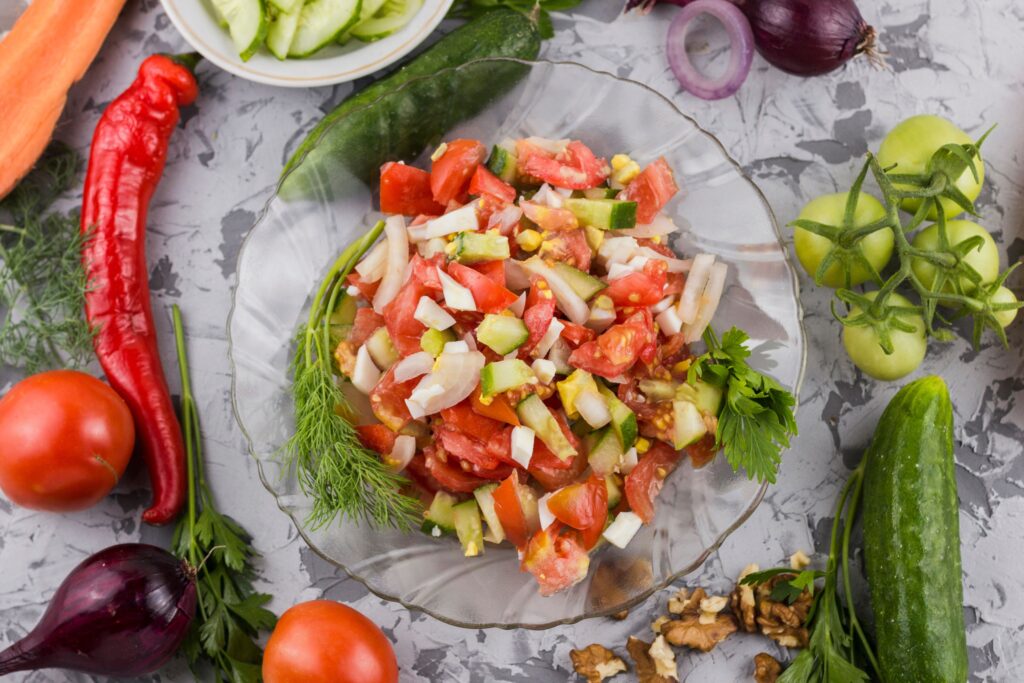Morocco’s culinary tradition of serving vibrant, flavorful salads as appetizers isn’t just about tantalizing the taste buds—it’s a time-honored practice rooted in digestive wisdom and nutritional science. These colorful mezze-style dishes, known locally as “salades marocaines,” offer far more than a prelude to the main course. Let’s explore how this Moroccan dining custom can transform your health, one delicious bite at a time.
Optimizing Digestion Through Raw Vegetables
Starting your meal with Moroccan salads like zaalouk, taktouka, or fresh tomato and cucumber salad prepares your digestive system for optimal performance. The raw or lightly cooked vegetables in these salads contain natural enzymes that kickstart the digestive process, helping your body break down the heavier dishes that follow.
The high fiber content in ingredients like carrots, beets, and eggplant stimulates digestive juices and promotes healthy gut motility, reducing bloating and discomfort after meals.
Blood Sugar Regulation and Weight Management
Consuming Moroccan salads before your tagine or couscous creates a protective effect against blood sugar spikes. The fiber-rich vegetables slow down the absorption of carbohydrates from subsequent dishes, maintaining steady glucose levels throughout your meal.
This practice naturally supports weight management goals, as the volume and water content of salads promote satiety, helping you feel fuller with less food. Studies consistently show that people who eat salads before meals consume fewer overall calories while feeling more satisfied.
Nutrient Absorption Enhancement
The diverse array of vitamins, minerals, and antioxidants in Moroccan salads—from the vitamin C in preserved lemons to the beta-carotene in carrots—primes your body for nutrient absorption. When consumed first, these micronutrients are absorbed more efficiently on a relatively empty stomach.
The healthy fats from olive oil, a staple in Moroccan salad dressings, facilitate the absorption of fat-soluble vitamins A, D, E, and K present in the vegetables, maximizing the nutritional value of your entire meal.
Building Business Partnerships Through Moroccan Cultural Events
In today’s interconnected world, businesses are constantly searching for innovative ways to establish trust, strengthen networks, and expand their reach....
Hiking Trails in the Middle Atlas Mountains
The Middle Atlas Mountains are often overshadowed by the High Atlas or the Rif, yet they hold some of Morocco’s...
From Passion to Profession: Turning Creative Skills into Income
In Morocco, more young people are transforming their creative talents into careers. Whether it’s photography, calligraphy, fashion design, or digital...
Young Moroccans Abroad: Balancing Wanderlust and Roots
For many young Moroccans, the dream of exploring the world is irresistible. Whether through study, work, or travel, living abroad...
Antioxidant Protection and Disease Prevention
Moroccan salads burst with antioxidant-rich ingredients like tomatoes, bell peppers, parsley, and cilantro. These compounds combat oxidative stress and inflammation in the body, reducing the risk of chronic diseases including heart disease, diabetes, and certain cancers.
The traditional spices used in Moroccan salads—cumin, paprika, and turmeric—add another layer of anti-inflammatory benefits. By consuming these protective compounds before your meal, you create a nutritional shield that helps counteract any potentially inflammatory components in richer dishes.
Real-Life Benefits: A Testimonial from Kenitra
Amina, a 42-year-old teacher from Casablanca share her experience.
“I started following my grandmother’s tradition of eating small portions of Moroccan salads before every meal six months ago. Not only have I lost seven kilos without strict dieting, but my chronic digestive issues have virtually disappeared. My energy levels are more stable throughout the day, and I no longer experience that heavy, uncomfortable feeling after eating. The simple act of eating zaalouk or a tomato-cucumber salad first has genuinely transformed my relationship with food and my overall wellbeing.”

Hydration and Detoxification Support
Most Moroccan salads contain high water content vegetables like cucumbers, tomatoes, and lettuce, contributing to your daily hydration needs. Proper hydration supports every cellular function in your body, from temperature regulation to waste elimination.
The combination of water, fiber, and natural compounds in these salads supports your body’s detoxification processes, helping your liver and kidneys function optimally. The lemon juice frequently used in Moroccan salad dressings provides additional cleansing benefits while alkalizing your system.
Conclusion
The Moroccan practice of serving salads before meals represents centuries of intuitive nutritional wisdom now validated by modern science. By incorporating this simple habit into your daily routine, you’re not just honoring a beautiful cultural tradition—you’re investing in better digestion, weight management, nutrient absorption, disease prevention, and overall vitality.
Whether you’re enjoying a traditional zaalouk with cumin-spiced eggplant or a refreshing tomato and onion salad dressed with olive oil and lemon, you’re giving your body the best possible start to every meal. Embrace this flavorful Moroccan custom and experience the transformative health benefits that generations of Moroccans have enjoyed.
















Discussion about this post